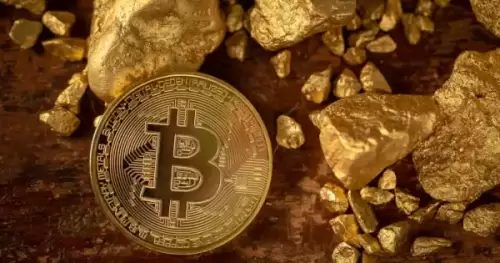 |
|
 |
|
 |
|
 |
|
 |
|
 |
|
 |
|
 |
|
 |
|
 |
|
 |
|
 |
|
 |
|
 |
|
 |
|
Cryptocurrency News Articles
Aluminium can tabs and 1934 coins are turning human waste into new types of rock
Apr 28, 2025 at 08:10 am

An aluminium drinks can tab made since 1989 and a 1934 coin are among the items that have helped scientists understand how quickly a new cycle of "anthropoclastic" rock formation is progressing.
The researchers have documented the rapid formation of a new "anthropoclastic rock cycle", which mimics natural rock cycles but involves human material over accelerated timescales.
They warn that the rapid and unplanned-for development of rock around industrial waste sites could have negative impacts on biodiversity and ecosystems, as well as land planning and coastal management.
Their findings, recently published in the journal Geology, came from analysis of a two-kilometre stretch of slag deposit, at Derwent Howe in West Cumbria.
The slag deposits have formed cliffs of waste material which are being eroded by coastal waves and tides, and the team carried out detailed analysis after noticing intriguing irregular formations in the cliffs.
Dr Amanda Owen of the University of Glasgow’s School of Geographical and Earth Sciences and one of the study’s authors, said: “For a couple of hundred years, we’ve understood the rock cycle as a natural process that takes thousands to millions of years.
“What’s remarkable here is that we’ve found these human-made materials being incorporated into natural systems and become lithified - essentially turning into rock - over the course of decades instead.
“It challenges our understanding of how a rock is formed, and suggests that the waste material we’ve produced in creating the modern world is going to have an irreversible impact on our future.”
Laboratory tests helped the researchers determine that Derwent Howe’s slag materials contain deposits of calcium, iron, magnesium, and manganese.
These elements are highly chemically reactive, which is key to causing the accelerated process of rock formation.
As the slag is eroded by the sea, it exposes the material to seawater and air, which interacts with the slag’s reactive elements to create natural cements including calcite, goethite, and brucite.
These cements are the same materials that bind together natural sedimentary rocks, but the chemical reactions cause the process to happen much faster than has been assumed to happen with similar material in a natural rock cycle.
Researchers also found modern materials – including the King George V coin and the aluminium can tab – which helped them to date how quickly the process is happening.
Dr John MacDonald, a co-author of the study, said: “We were able to date this process with remarkable precision.
“We found both a King George V coin from 1934 and an aluminium can tab with a design that we realised couldn’t have been manufactured before 1989.
“This gives us a maximum timeframe of 35 years for this rock formation, which is mind-bogglingly fast; it’s all unfolding within the course of a single human lifetime.
“This is an example in microcosm of how all the activity we’re undertaking at the Earth’s surface will eventually end up in the geological record as rock, but this process is happening with remarkable, unprecedented speed.”
Researchers have warned that the process could have an impact on ecosystems and said more research is needed.
Dr David Brown, the paper’s third co-author, said: “On coasts like Derwent Howe, the process of lithification has turned a sandy beach into a rocky platform very, very quickly.
“That rapid appearance of rock could fundamentally affect the ecosystems above and below the water, as well as change the way that coastlines respond to the challenges of rising sea levels and more extreme weather as our planet warms.
“Currently, none of this is accounted for in our models of erosion of land management, which are key to helping us try to adapt to climate change.
“We’re currently seeking additional funding to help support further research at other slag deposit sites across Europe, which will help to deepen our understanding of this new rapid anthropoclastic rock cycle.”
The research is published in the journal Geology.
In the paper, the team note that a similar process had previously been observed in the Gorrondatxe coastal system near Bilbao, Spain.
However they said that researchers there were unable to determine how long the process had been occuring due to the waste being deposited in the sea before being returned to the beach.
Disclaimer:info@kdj.com
The information provided is not trading advice. kdj.com does not assume any responsibility for any investments made based on the information provided in this article. Cryptocurrencies are highly volatile and it is highly recommended that you invest with caution after thorough research!
If you believe that the content used on this website infringes your copyright, please contact us immediately (info@kdj.com) and we will delete it promptly.






























































